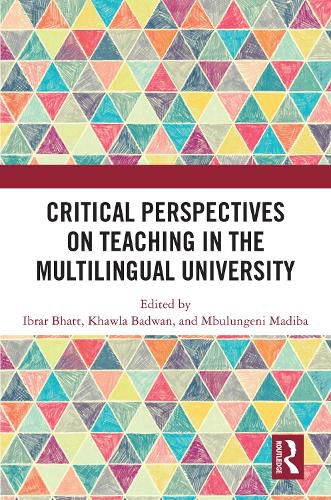Readings Newsletter
Become a Readings Member to make your shopping experience even easier.
Sign in or sign up for free!
You’re not far away from qualifying for FREE standard shipping within Australia
You’ve qualified for FREE standard shipping within Australia
The cart is loading…






This book critically and re?ectively engages with the 'Language Problem' in the contemporary multilingual university. It paints a complex picture of the lived multilingual realities of teachers and students in universities across geographies such as Pakistan, Timor-Leste, South Korea, Bangladesh, Somaliland, Afghanistan, Fiji, Colombia, and the UK (including Northern Ireland) and focuses on three overall analytic themes: language and colonial epistemologies, language policies and practices, and language and research.
Globalisation, global knowledge economy, and neoliberal governance has significantly impacted higher education by elevating colonial languages, particularly English, to a global academic lingua franca. Universities now collaborate and compete globally, with English emerging as the dominant language for education and research. The imposition, or uncritical adoption, of English poses profound political, cultural, and epistemic challenges for those who have to use the language in everyday university administration, research, and teaching and also intertwines with issues of race, gender, coloniality, and social class. This volume addresses this as higher education's multifaceted Language Problem which requires interdisciplinary collaboration and critical debate, and ultimately aims towards understanding multilingualism in higher education across both the Global North and South.
The contributions to this book continue to remind us of the coloniality of language and of the linguistic strati?cation that governs epistemological structures and power relations in the academy. It will be of interest to scholars, researchers, and practitioners of higher education, applied linguistics, education policy and politics, and sociology of education. This book was originally published as a special issue of the journal Teaching in Higher Education.
$9.00 standard shipping within Australia
FREE standard shipping within Australia for orders over $100.00
Express & International shipping calculated at checkout
This book critically and re?ectively engages with the 'Language Problem' in the contemporary multilingual university. It paints a complex picture of the lived multilingual realities of teachers and students in universities across geographies such as Pakistan, Timor-Leste, South Korea, Bangladesh, Somaliland, Afghanistan, Fiji, Colombia, and the UK (including Northern Ireland) and focuses on three overall analytic themes: language and colonial epistemologies, language policies and practices, and language and research.
Globalisation, global knowledge economy, and neoliberal governance has significantly impacted higher education by elevating colonial languages, particularly English, to a global academic lingua franca. Universities now collaborate and compete globally, with English emerging as the dominant language for education and research. The imposition, or uncritical adoption, of English poses profound political, cultural, and epistemic challenges for those who have to use the language in everyday university administration, research, and teaching and also intertwines with issues of race, gender, coloniality, and social class. This volume addresses this as higher education's multifaceted Language Problem which requires interdisciplinary collaboration and critical debate, and ultimately aims towards understanding multilingualism in higher education across both the Global North and South.
The contributions to this book continue to remind us of the coloniality of language and of the linguistic strati?cation that governs epistemological structures and power relations in the academy. It will be of interest to scholars, researchers, and practitioners of higher education, applied linguistics, education policy and politics, and sociology of education. This book was originally published as a special issue of the journal Teaching in Higher Education.